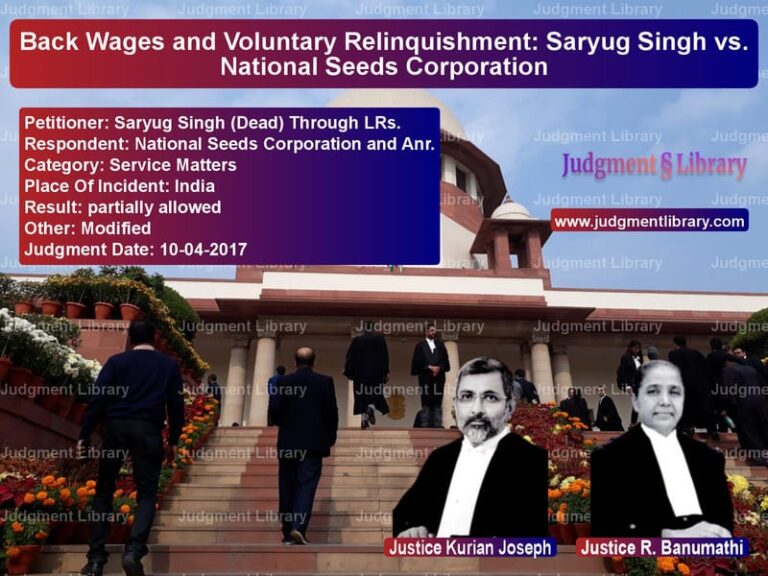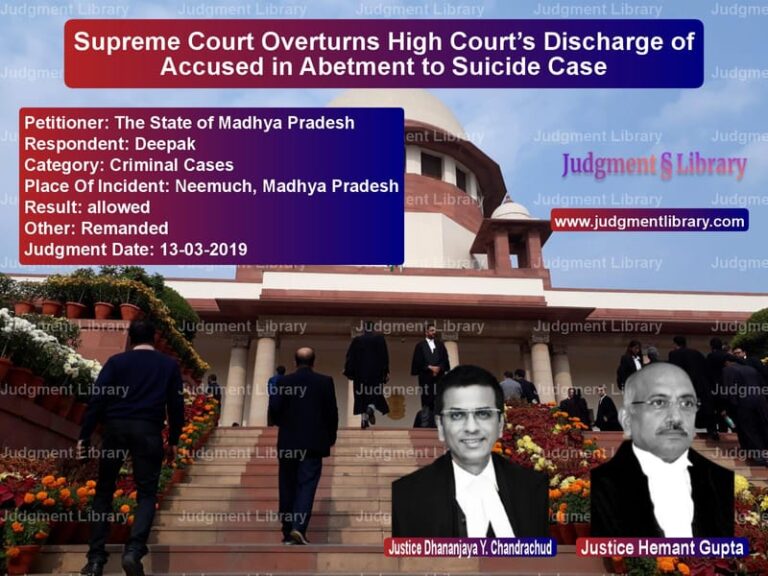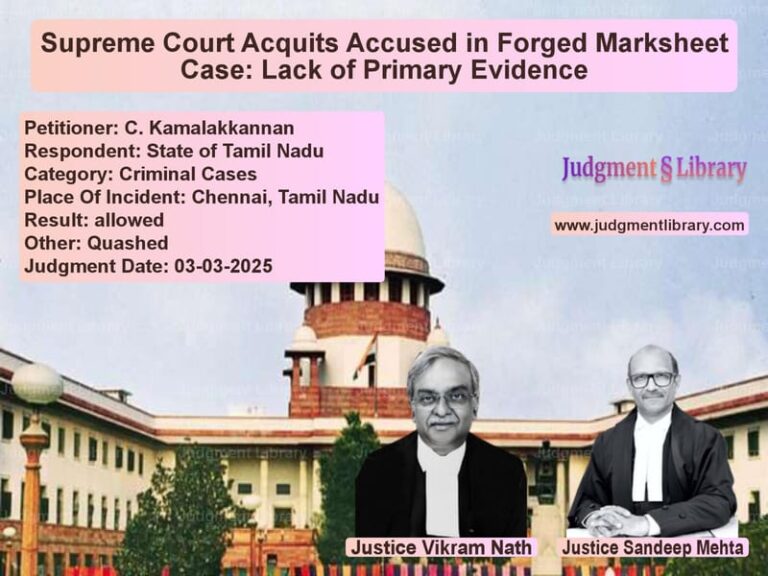Supreme Court Upholds Life Sentence for Husband in Kerala Uxoricide Case
The case of Anil Kumar vs. State of Kerala revolves around the tragic death of the appellant’s wife due to burn injuries. The Supreme Court was called upon to determine whether Anil Kumar was guilty of murder (Section 302 IPC) and cruelty to wife (Section 498A IPC). The conviction was upheld, confirming a life sentence for the accused.
Background of the Case
The case dates back to September 26, 2010, when Anil Kumar’s wife suffered fatal burns at their residence. The prosecution alleged that after an argument, the deceased poured kerosene on herself, and the appellant, instead of stopping her, threw a lit matchstick at her, setting her ablaze.
The wife was initially rushed to the hospital but succumbed to her injuries later. The police first registered a case under Section 307 IPC (attempt to murder), but after her death, the charge was upgraded to Section 302 IPC (murder).
Read also: https://judgmentlibrary.com/supreme-court-revises-conviction-in-rajasthan-murder-case-key-takeaways/
Trial Court Conviction
The trial court found Anil Kumar guilty under:
- Section 302 IPC: Sentencing him to life imprisonment and a fine of Rs. 50,000, with a one-year simple imprisonment in default.
- Section 498A IPC: Sentencing him to one-year rigorous imprisonment.
- Both sentences were ordered to run concurrently.
High Court’s Decision
On appeal, the Kerala High Court affirmed the trial court’s findings. It relied on:
- Eyewitness testimonies, including the couple’s minor son.
- Statements from neighbors and medical reports confirming 96% burn injuries.
- The victim’s dying declarations recorded by a Judicial Magistrate and a police officer.
Petitioner’s Arguments
Anil Kumar, represented by his defense counsel, argued:
- He had no premeditated intent to kill his wife.
- His wife had suicidal tendencies and had attempted self-harm previously.
- She had poured kerosene on herself voluntarily, and he had merely tried to douse the fire with water.
- The evidence against him was circumstantial and based on contradictions.
- The case should be considered under Section 304 Part-II IPC (culpable homicide not amounting to murder) instead of Section 302.
Respondent’s Arguments
The prosecution, representing the State of Kerala, countered:
- The appellant had a history of domestic violence and harassment over dowry demands.
- Witnesses confirmed that the accused had beaten his wife on the day of the incident.
- The victim’s dying declaration explicitly stated that her husband set her on fire after she poured kerosene.
- The argument of sudden provocation was not valid, as the act was deliberate.
Key Legal Issues Considered
1. Whether the Death Was a Result of Suicide or Murder
The Supreme Court analyzed:
- The forensic and medical reports indicating burn injuries consistent with an external ignition source.
- Eyewitness testimonies, particularly from the victim’s minor son.
- The consistency between the multiple dying declarations recorded.
2. Admissibility of Dying Declarations
The Court noted that:
- The deceased gave a statement before a Judicial Magistrate while conscious and coherent.
- The dying declaration was corroborated by a second statement recorded by the police.
- There was no evidence of external influence or coercion in recording the statements.
3. Whether Section 302 IPC or Section 304 IPC Should Apply
The Court examined whether the case fell under:
- Section 302 IPC (Murder): Premeditated act with intention to kill.
- Section 304 Part-II IPC: Act done without intent but with knowledge of likely fatal consequences.
Since the accused threw a lit matchstick knowing his wife was drenched in kerosene, the Court ruled that it was an intentional act warranting conviction under Section 302 IPC.
Supreme Court’s Verdict
The Supreme Court upheld the life sentence, ruling:
- The dying declarations were reliable and legally admissible.
- The accused had intent to kill, as evidenced by his past domestic abuse and the manner in which the act was committed.
- The argument that the victim had a suicidal tendency was unsubstantiated.
- The life sentence and fine imposed by the lower courts were justified.
- The appellant may seek remission as per state policy after serving the prescribed period.
Key Takeaways from the Judgment
- Dying Declarations Hold Strong Evidentiary Value: The Court reaffirmed that a well-recorded dying declaration is sufficient for conviction.
- Domestic Violence and Harassment Are Key Factors: A history of abuse strengthens the prosecution’s case in uxoricide trials.
- Premeditation Not Always Required for Murder Conviction: If the accused acts knowing the consequences, intent is inferred.
- Remission Available After Serving Sentence: The Court indicated the accused could apply for remission after serving a significant period.
This ruling reinforces strict legal treatment of domestic violence-related deaths and the importance of treating dying declarations as crucial evidence in criminal trials.
Petitioner Name: Anil Kumar.Respondent Name: State of Kerala.Judgment By: Justice Abhay S. Oka, Justice Pankaj Mithal.Place Of Incident: Kerala, India.Judgment Date: 01-11-2023.
Don’t miss out on the full details! Download the complete judgment in PDF format below and gain valuable insights instantly!
Download Judgment: anil-kumar-vs-state-of-kerala-supreme-court-of-india-judgment-dated-01-11-2023.pdf
Directly Download Judgment: Directly download this Judgment
See all petitions in Murder Cases
See all petitions in Domestic Violence
See all petitions in Dowry Cases
See all petitions in Judgment by Abhay S. Oka
See all petitions in Judgment by Pankaj Mithal
See all petitions in dismissed
See all petitions in supreme court of India judgments November 2023
See all petitions in 2023 judgments
See all posts in Criminal Cases Category
See all allowed petitions in Criminal Cases Category
See all Dismissed petitions in Criminal Cases Category
See all partially allowed petitions in Criminal Cases Category







